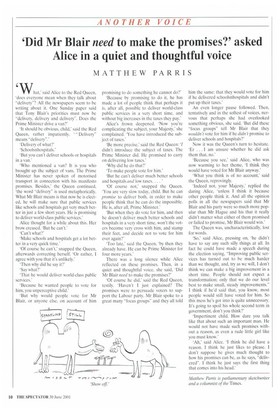'Did Mr Blair need to make the promises?' asked Alice in a quiet and thoughtful voice
MATTHEW PARR IS
What,said Alice to the Red Queen, 'does everyone mean when they talk about -delivery-? All the newspapers seem to be writing about it. One Sunday paper said that Tony Blair's priorities must now be "delivery, delivery and delivery". Does the Prime Minister drive a van?'
'It should be obvious, child,' said the Red Queen, rather impatiently. ' " Delivery" means "delivery": 'Delivery of what?'
`Schoolsnhospitals.'
'But you can't deliver schools or hospitals in a van.'
Who mentioned a van? It is you who brought up the subject of vans. The Prime Minister has never spoken of motorised transport in connection with his manifesto promises. Besides,' the Queen continued, 'the word "delivery" is used metaphorically. What Mr Blair means is that now he is elected, he will make sure that public services like schools and hospitals get very much better in just a few short years. He is promising to deliver world-class public services.'
Alice thought for a while about this. Her brow creased. 'But he can't.'
'Can't what?'
'Make schools and hospitals get a lot better in a very quick time.'
'Of course he can't,' snapped the Queen, afterwards correcting herself. 'Or rather, I agree with you that it's unlikely.'
'Then why did he say it?'
'Say what?'
'That he would deliver world-class public services.'
'Because he wanted people to vote for him, you unperceptive child.'
'But why would people vote for Mr Blair, or anyone else, on account of him promising to do something he cannot do?'
'Because by promising to do it, he has made a lot of people think that perhaps it is, after all, possible to deliver world-class public services in a very short time, and without big increases in the taxes they pay.'
Alice's frown deepened. 'Now you're complicating the subject, your Majesty,' she complained. 'You have introduced the subject of taxes.'
'Be more precise,' said the Red Queen:'! didn't introduce the subject of taxes. The Prime Minister did. He promised to carry on delivering low taxes.'
'Why did he do that?'
'To make people vote for him.'
'But he can't deliver much better schools and hospitals and low taxes. . '
'Of course not,' snapped the Queen. 'You are very slow today, child. But he can promise to deliver both, in order to make people think that he can do the impossible. He is, after all, Prime Minister.'
'But when they do vote for him, and then he doesn't deliver much better schools and hospitals in a very short time, won't the voters become very cross with him, and stamp their feet, and decide not to vote for him ever again?'
Too late,' said the Queen, `by then they already have. He can be Prime Minister for four more years.'
There was a long silence while Alice reflected on these promises. Then, in a quiet and thoughtful voice, she said, Did Mr Blair need to make the promises?'
'Of course he did,' said the Red Queen, testily. 'Haven't I just explained? The promises were to persuade voters to support the Labour party. Mr Blair spoke to a great many "focus groupsand they all told
him the same: that they would vote for him if he delivered schoolsnhospitals and didn't put up their taxes.'
An even longer pause followed. Then, tentatively and in the softest of voices, nervous that perhaps she had overlooked something obvious, she said, 'But did these "focus groups" tell Mr Blair that they wouldn't vote for him if he didn't promise to deliver schools and hospitals?'
Now it was the Queen's turn to hesitate. 'Er . . I am unsure whether he did ask them that, no.'
'Because you see,' said Alice, who was now warming to her theme, 'I think they would have voted for Mr Blair anyway.'
'What you think is of no account,' said the Queen, reprovingly.
'Indeed not, your Majesty.' replied the daring Alice, 'unless I think it because other people think it. And all the opinion polls in all the newspapers said that Mr Blair and his party were so much more popular than Mr Hague and his that it really didn't matter what either of them promised or failed to promise, Mr Blair would win.'
The Queen was, uncharacteristically, lost for words.
'So,' said Alice, pressing on, 'he didn't have to say any such silly things at all. In fact he could have made a speech during the election saying, "Improving public services has turned out to be much harder than we thought, and, try as we will, I don't think we can make a big improvement in a short time. People should not expect a transformation; only that we do our level best to make small, steady improvements." I think if he'd said that, you know, most people would still have voted for him. So this mess he's got into is quite unnecessary. It's going to spoil his whole second term in government, don't you think?'
Impertinent child. How dare you talk like that about such an important man. He would not have made such promises without a reason, as even a rude little girl like you must know.'
'Ah,' said Alice. 'I think he did have a reason. I think he just likes to please. I don't suppose he gives much thought to how his promises can be, as he says, "delivered". I think he just says the first thing that comes into his head.'
Matthew Panis is parliamentary sketchwriter and a columnist of the Times.










































































 Previous page
Previous page